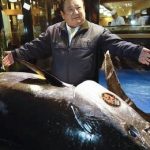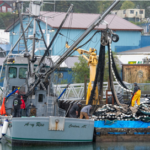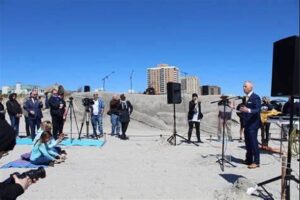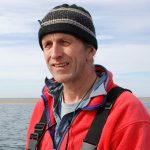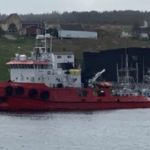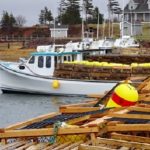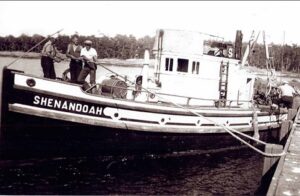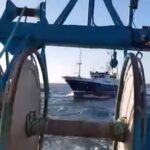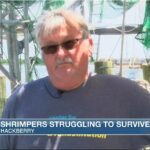Daily Archives: January 13, 2017
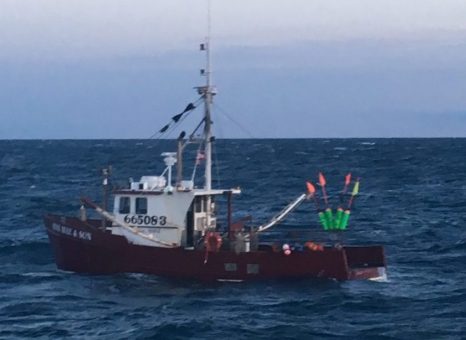
Coast Guard saves 2 lobstermen from sinking vessel off the coast of Maine
The Coast Guard rescued two people off their sinking vessel Friday, about 17 miles off shore from York, Maine. At around 3:15 p.m., Coast Guard Sector Northern New England received a MAYDAY call on VHF-CH. 16 from a crew member reporting their 45-foot lobster boat, Miss Mae & Son, was hit with a rogue wave and the pumps could not keep up with the water. A boat crew from Station Portsmouth Harbor launched their 47-foot response boat and arrived on the scene to find the fishermen standing on the pilot house in full survival gear. Due to safety concerns, the fishermen jumped into the water and the boat crew pulled alongside to bring them on board. The water temperature was 42 degrees and the air temperature was 37 degrees. The fishermen are being brought back to Station Portsmouth Harbor and no injuries have been reported. Sector Northern New England is currently issuing a broadcast to mariners informing them the lobster boat is taking on water and adrift with nobody on board. Link 20:23
New money for Quebec seal hunt – UPEI researcher to study commercial potential of grey seals in Magdalen Islands
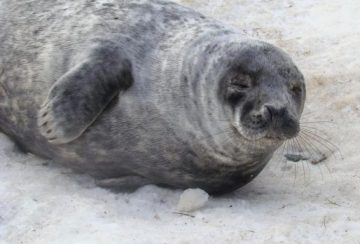 After rejecting a scientific study that involved culling 1,200 grey seals from the Brion Island nature reserve in the Magdalen Islands, the province is helping to finance similar research nearby. The $72,904 in funding will allow a University of Prince Edward Island researcher to study an unspecified number of grey seals harvested on Corps Mort, or Dead Man’s Island, a few kilometres west of the Magdalen Islands archipelago. Wildlife veterinarian and pathologist Pierre-Yves Daoust is pleased the Quebec government decided to support an alternative proposal. Some opponents of the seal hunt are appalled by the decision. “We are deeply disappointed to see this so-called study funded,” said (panhandler) Rebecca Aldworth, executive director of Humane Society International – Canada, calling the study a make-work project for the commercial sealing industry. Read the story here 19:28
After rejecting a scientific study that involved culling 1,200 grey seals from the Brion Island nature reserve in the Magdalen Islands, the province is helping to finance similar research nearby. The $72,904 in funding will allow a University of Prince Edward Island researcher to study an unspecified number of grey seals harvested on Corps Mort, or Dead Man’s Island, a few kilometres west of the Magdalen Islands archipelago. Wildlife veterinarian and pathologist Pierre-Yves Daoust is pleased the Quebec government decided to support an alternative proposal. Some opponents of the seal hunt are appalled by the decision. “We are deeply disappointed to see this so-called study funded,” said (panhandler) Rebecca Aldworth, executive director of Humane Society International – Canada, calling the study a make-work project for the commercial sealing industry. Read the story here 19:28
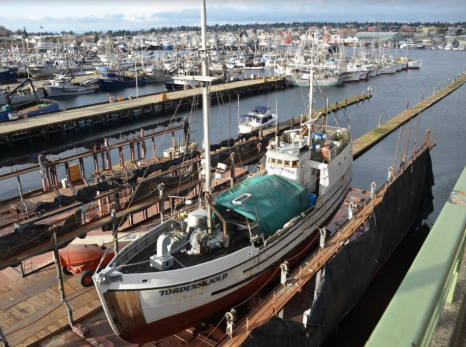
Ballard-built fishing schooner retired, finds a new home at Northwest Seaport
After more than a century of hard fishing in the North Pacific Ocean, the 1911 halibut schooner, Tordenskjold, is retiring to become an operational museum ship and education platform at Northwest Seaport on Lake Union in Seattle. On December 27th, the boat was drydocked at Fishing Vessel Owner’s Marine Ways (located at Fishermen’s Terminal), the shipyard that has cared for the boat for much, if not all, of its 105 years afloat. There, it spent a week undergoing a final inspection survey, laser scanning and repainting before being transferred to Northwest Seaport. Read the story here 15:13
FISH-NL renews call for province to allow in outside buyers; ensure provincially owned quotas caught by inshore harvesters
 In light of declining south coast cod stocks, the Federation of Independent Sea Harvesters of Newfoundland and Labrador (FISH-NL) is renewing its call that the provincial government lift all restrictions and allow out-of-province buyers into the provincial marketplace for all species. FISH-NL also calls on the province to ensure the provincially owned 150-tonne halibut quota is caught by the inshore harvesters of Newfoundland and Labrador. “Fish harvesters cannot survive on 60 cents a pound for cod, which is what they made last year and what they made 30 years before that,” says Ryan Cleary, President of FISH-NL. “It’s time to blow open the doors to the provincial marketplace and allow in outside buyers.” Read the press release here 14:42
In light of declining south coast cod stocks, the Federation of Independent Sea Harvesters of Newfoundland and Labrador (FISH-NL) is renewing its call that the provincial government lift all restrictions and allow out-of-province buyers into the provincial marketplace for all species. FISH-NL also calls on the province to ensure the provincially owned 150-tonne halibut quota is caught by the inshore harvesters of Newfoundland and Labrador. “Fish harvesters cannot survive on 60 cents a pound for cod, which is what they made last year and what they made 30 years before that,” says Ryan Cleary, President of FISH-NL. “It’s time to blow open the doors to the provincial marketplace and allow in outside buyers.” Read the press release here 14:42
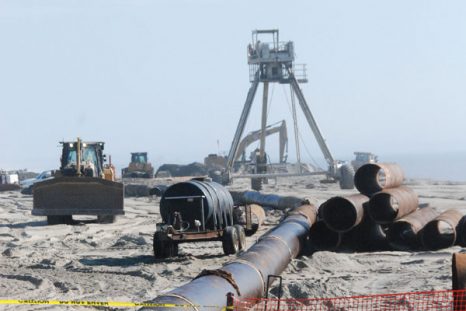
New Jersey Fishermen, beach builders fight for ancient underwater sand hills
Just a few miles off New Jersey’s coast are a series of underwater hills on the ocean floor, made of perfect quality beach sand tens of thousands of years old. The value of these ancient sand hills to sea life, fishermen, scientists and beach-building engineers has set up a fight between those who would protect them and those who would mine them. And that battle is only expected to intensify as rising sea levels are expected to magnify. Meanwhile, every beach on New Jersey’s 127-mile coast will soon have been engineered or replenished after 2012’s Hurricane Sandy, with the U.S. Army Corps of Engineers promising to keep replenishing them for another 50 years. There are only two projects left to do – the Absecon Island project covering Longport through Atlantic City, and the Monmouth/Ocean counties project covering Manasquan to Barnegat inlets. Read the story here 14:12
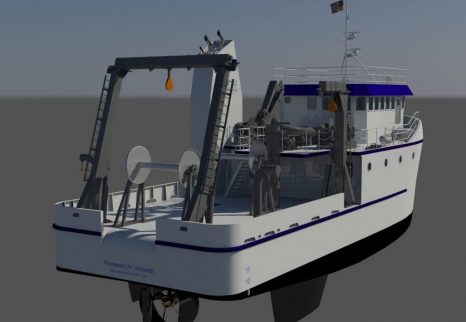
Virginia Institute of Marine Science Orders Research Vessel
Virginia Institute of Marine Science of Gloucester Point, Va. awarded a contract to Meridien Maritime Reparation of Matane, Quebec to construct a 93-foot research vessel. JMS Naval Architects of Mystic, Conn. designed the research vessel to replace VIMS’s current vessel, the R/V Bay Eagle. The primary mission of the Institute’s fleet is to provide inshore and offshore work platforms for the support of fisheries related oceanographic research projects. The new vessel will be capable of conducting fisheries assessments of greater capacity, in deeper waters and with a larger science complement than the Bay Eagle. In addition, the new vessel will greatly expand VIMS’s capability to perform general oceanographic research in the Chesapeake Bay and the mid-Atlantic near coastal waters. The state-of-the-art research vessel offers enormous capability in a small package that is also economic to build and operate. Read the rest here 13:28
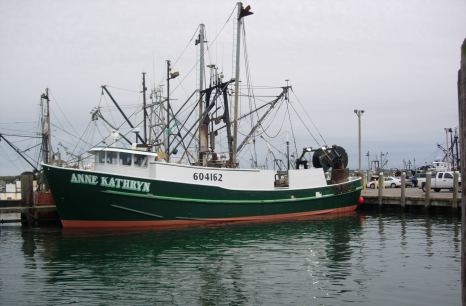
Despite recent tweaks, New England fishermen want more changes in law
In October of 2016 NOAA made changes to NS1, which aims to prevent overfishing while achieving the optimum yield from each fishery. Changes were first proposed in January 2015, and the final rule passed in October 2016 giving regional councils more latitude to set catch limits, a change that was opposed by environmental groups. Fishermen, particularly on the US east coast, have been critical for several years of what they say are rigid timelines that give regulators ten years to rebuild stocks deemed overfished. Conservation groups, on the other hand, see the added flexibility as a weakening of Magnuson-Stevens that undermines the stringent standards that brought many fisheries back to health. Read the story here 12:01
The Magnuson Stevens Act and its Ten Year Rebuilding Timeline: Science or Fiction by Meghan Lapp Click here to read this white paper
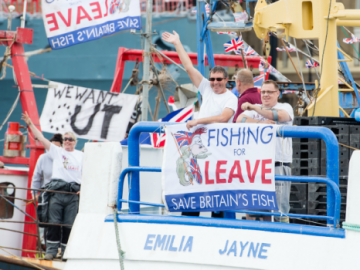
Quota Challenge as English Fishermen Claim They Are Being Sacrificed to Appease Scottish Nationalists
The National Federation of Fishermen’s Organisations (NFFO), which represents fishermen in England, Wales, and Northern Ireland, has railed against the UK government for adopting “a policy of appeasement” towards separatist politicians in Scotland, handing over 1,500 tonnes of England’s fishing quota to the devolved administration in Edinburgh. Scotland voted to remain in the United Kingdom in 2014, but the Scottish National Party (SNP) has retained its grip on the regional executive, albeit as a minority administration. While nominally concerned with achieving full Scottish independence, the leadership of the SNP are staunchly in favour of the European Union (EU). Following the Brexit vote last year, SNP leader Nicola Sturgeon has been pressuring Theresa May to either keep the UK in the Single Market or find a way for Scotland to remain in it while the rest of the UK leaves. Read the story here 11:26
McCrory set stage for latest threat to shrimping
 The North Carolina Marine Fisheries Commission appears poised to pass a new regulation that many critics say will drastically impact, perhaps even shut down, North Carolina’s shrimping industry. On Jan. 17, the Marine Fisheries Commission will be holding a hearing in New Bern on the rule, which would essentially make all inland waterways a “secondary nursery” for fin fish, significantly curtailing the use of trawl nets to harvest shrimp. After a huge turnout at a public hearing in 2013, the MFC denied a petition from an individual angler to implement similar rules. But with anti-shrimping forces possessing what appears to be a super-majority on the MFC, the petition and hearings are back, this time proposed by the North Carolina Wildlife Federation, a group closely allied with the Coastal Conservation Association — a special interest group that has long sought to ban shrimp trawls and finfish netting from the state’s inland waters. Ironically, local commercial fishermen, who have heavily supported the GOP in state elections, have former Governor Pat McCrory to thank for their predicament. Read the story here 10:56
The North Carolina Marine Fisheries Commission appears poised to pass a new regulation that many critics say will drastically impact, perhaps even shut down, North Carolina’s shrimping industry. On Jan. 17, the Marine Fisheries Commission will be holding a hearing in New Bern on the rule, which would essentially make all inland waterways a “secondary nursery” for fin fish, significantly curtailing the use of trawl nets to harvest shrimp. After a huge turnout at a public hearing in 2013, the MFC denied a petition from an individual angler to implement similar rules. But with anti-shrimping forces possessing what appears to be a super-majority on the MFC, the petition and hearings are back, this time proposed by the North Carolina Wildlife Federation, a group closely allied with the Coastal Conservation Association — a special interest group that has long sought to ban shrimp trawls and finfish netting from the state’s inland waters. Ironically, local commercial fishermen, who have heavily supported the GOP in state elections, have former Governor Pat McCrory to thank for their predicament. Read the story here 10:56
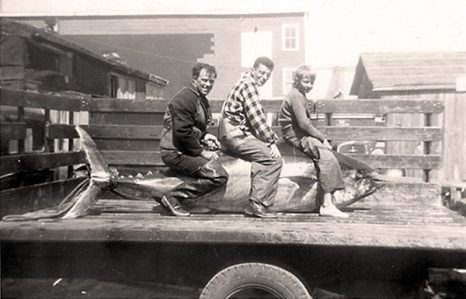
A Look Back At Cape Cod’s Fish Traps
My father was a commercial tuna fisherman in the 1940s and 50s, when the predominant way to catch tuna in New England waters was using weirs, or “fish traps.” Weir fishermen rely on nets and nature to make their catches. These weirs consist of long poles driven into the ocean floor, with nets strung from them. A long, straight line of poles and nets running in an offshore direction from shallower water toward deeper water would create a barrier, and at the deepest point of this barrier, there would be a heart-shaped chamber with a purse seine strung from it. The fish would swim along the coast until they were blocked by the trap. Their natural instinct to swim toward deeper water would bring them into the heart of the net. Once there, they would get disoriented and, unable to find an exit, be trapped until the fishermen returned to harvest them. More images, read the story here 10:33
In advance of its annual meeting in Victoria, British Columbia, Jan. 23-27, IPHC posts catch limit proposals
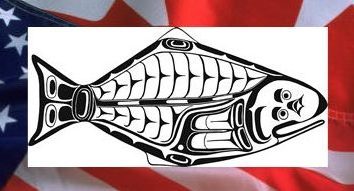 In advance of its annual meeting in Victoria, British Columbia, Jan. 23-27, the International Pacific Halibut Commission accepted proposals through Dec. 31 on catch limits or harvest advice. Of the eight proposals noted so far by the IPHC, six were specific to Area 2C in Southeast Alaska, including one from a group of processors and fishing associations who contend that reductions in Area 2C catch limits are not justified by current data or trends. Area 2C stocks are increasing at current harvest rates, and the Area 2C survey weight per unit of effort is higher than any other IPHC area coast-wide, the proposal said. The document was signed by Kathy Hansen, Southeast Alaska Fishermen’s Alliance; Megan O’Neil, Petersburg Vessel Owner’s Association; Dale Kelley, Alaska Trollers Association; Dan Falvey, Alaska Longline Fishermen’s Association Joe Morrelli, Seafood Producers Cooperative; Don Spigelmyer, Icicle Seafoods; and Mike Erickson, Alaska Glacier Seafoods. Read the rest here 09:40
In advance of its annual meeting in Victoria, British Columbia, Jan. 23-27, the International Pacific Halibut Commission accepted proposals through Dec. 31 on catch limits or harvest advice. Of the eight proposals noted so far by the IPHC, six were specific to Area 2C in Southeast Alaska, including one from a group of processors and fishing associations who contend that reductions in Area 2C catch limits are not justified by current data or trends. Area 2C stocks are increasing at current harvest rates, and the Area 2C survey weight per unit of effort is higher than any other IPHC area coast-wide, the proposal said. The document was signed by Kathy Hansen, Southeast Alaska Fishermen’s Alliance; Megan O’Neil, Petersburg Vessel Owner’s Association; Dale Kelley, Alaska Trollers Association; Dan Falvey, Alaska Longline Fishermen’s Association Joe Morrelli, Seafood Producers Cooperative; Don Spigelmyer, Icicle Seafoods; and Mike Erickson, Alaska Glacier Seafoods. Read the rest here 09:40
Stakeholders Seek Baltimore Canyon National Marine Sanctuary Designation Withdrawal
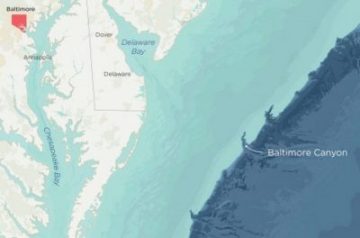 Two weeks after the National Aquarium expressed a willingness to consider withdrawing an application to designate the Baltimore Canyon as a , a coalition of local marina owners and boat captains last week fired off a letter seeking to hold him to his word. Last week, attorney Mark Cropper, who represents multiple resort area marinas, boat owners and captains and other stakeholders in the resort area, fired off his own letter to Racanelli essentially holding the National Aquarium CEO to his word and calling for the application to be withdrawn as offered. Read the story here 08:47
Two weeks after the National Aquarium expressed a willingness to consider withdrawing an application to designate the Baltimore Canyon as a , a coalition of local marina owners and boat captains last week fired off a letter seeking to hold him to his word. Last week, attorney Mark Cropper, who represents multiple resort area marinas, boat owners and captains and other stakeholders in the resort area, fired off his own letter to Racanelli essentially holding the National Aquarium CEO to his word and calling for the application to be withdrawn as offered. Read the story here 08:47


































